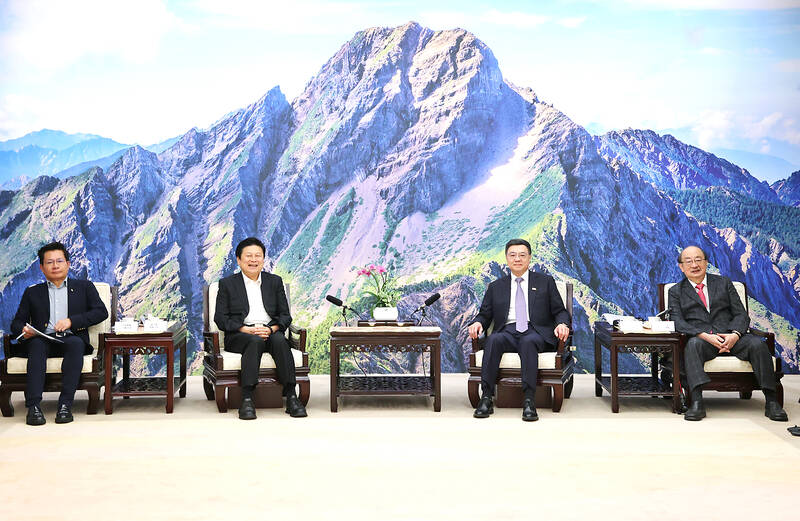Premier Cho Jung-tai (長卓榮) yesterday reached an agreement with opposition parties to provide more compensation to indigenous people for lost logging revenue, hopefully breaking a stalemate in the review of next year’s government budget.
The fiscal budget has been stalled in the Legislative Yuan since the Chinese Nationalist Party (KMT) and Taiwan People’s Party voted to reject it six times in past months.
To break the impasse, Cho invited delegations from all three parties for a sit-down meeting at the Executive Yuan that was also attended by key Cabinet officials, including Vice Premier Cheng Li-chun (鄭麗君), Directorate-General of Budget, Accounting and Statistics Minister Chen Shu-tzu (陳淑姿), Minister of Health and Welfare Chiu Tai-yuan (邱泰源) and Council of Indigenous Peoples Minister Ljaucu Zingrur.

Photo courtesy of the Taipei Photography Association via CNA
Talks appeared to have gone smoothly, as the parties reached an agreement and ended the meeting shortly after 4pm yesterday.
Caucus representatives and their deputies signed an agreement that was shown to reporters outside the Executive Yuan building, with lawmakers planning to schedule a review of the central government budget at today’s Procedure Committee meeting.
Cho agreed to raise compensation for indigenous people who refrain from logging on their lands from NT$30,000 per hectare to NT$60,000 per hectare annually (US$931 to US$1,861).
Officials said an additional budget of NT$4.2 billion would be needed for the plan.
The agreement states that all sides have agreed to complete the procedure “in accordance with amended provisions of the Logging Ban Compensation for Lands Reserved for Indigenous Peoples Act (原住民保留地禁伐補償實施辦法),” and to allocate government funds for the increased compensation.
The act was amended by opposition lawmakers in June to require higher compensation, a move opposed by the government, which said that Article 70 of the Constitution prohibits the legislature from proposing increases to expenditures planned by the Executive Yuan.
The additional budget allocation conforms to Article 91 of the Budget Act (預算法) and Article 5 of the Fiscal Discipline Act (財政紀律法), it said.
On the other two issues of contention, the agreement said that all parties agreed to the Cabinet’s proposal to adjust the “floating point value” in the National Health Insurance (NHI) scheme to NT$0.95 by June 30 next year, which is used to calculate the reimbursement rate to healthcare facilities for medical services.
The Cabinet also agreed to report to the Legislative Yuan by the end of the year on adjusting measures to increase the government’s purchase price for grain.
Opposition parties have demanded a price increase of NT$5 per kilogram to benefit farmers, saying that the price has not been raised for 13 years.
Democratic Progressive Party caucus whip Ker Chien-ming (柯建銘) said that he and his delegation brought goodwill to the negotiations.
By law, the Cabinet is responsible for proposing the budget and the Legislative Yuan must consult with the Cabinet in order to request any substantial increases.
“All parties came here with an open mind and positive attitude for today’s negotiation, to reach an agreement with the Cabinet. It is good to have mutual respect from all sides and agree on issues that also conform to the Constitution, Budget Act and others,” Ker said.
“It is unwise to impede next year’s national budget due to disputes on several smaller issues,” he said.

The High Prosecutors’ Office yesterday withdrew an appeal against the acquittal of a former bank manager 22 years after his death, marking Taiwan’s first instance of prosecutors rendering posthumous justice to a wrongfully convicted defendant. Chu Ching-en (諸慶恩) — formerly a manager at the Taipei branch of BNP Paribas — was in 1999 accused by Weng Mao-chung (翁茂鍾), then-president of Chia Her Industrial Co, of forging a request for a fixed deposit of US$10 million by I-Hwa Industrial Co, a subsidiary of Chia Her, which was used as collateral. Chu was ruled not guilty in the first trial, but was found guilty

DEADLOCK: As the commission is unable to forum a quorum to review license renewal applications, the channel operators are not at fault and can air past their license date The National Communications Commission (NCC) yesterday said that the Public Television Service (PTS) and 36 other television and radio broadcasters could continue airing, despite the commission’s inability to meet a quorum to review their license renewal applications. The licenses of PTS and the other channels are set to expire between this month and June. The National Communications Commission Organization Act (國家通訊傳播委員會組織法) stipulates that the commission must meet the mandated quorum of four to hold a valid meeting. The seven-member commission currently has only three commissioners. “We have informed the channel operators of the progress we have made in reviewing their license renewal applications, and

Taiwan People’s Party (TPP) Chairman Huang Kuo-chang (黃國昌) yesterday appealed to the authorities to release former Taipei mayor Ko Wen-je (柯文哲) from pretrial detention amid conflicting reports about his health. The TPP at a news conference on Thursday said that Ko should be released to a hospital for treatment, adding that he has blood in his urine and had spells of pain and nausea followed by vomiting over the past three months. Hsieh Yen-yau (謝炎堯), a retired professor of internal medicine and Ko’s former teacher, said that Ko’s symptoms aligned with gallstones, kidney inflammation and potentially dangerous heart conditions. Ko, charged with

Taiwan-based publisher Li Yanhe (李延賀) has been sentenced to three years in prison, fined 50,000 yuan (US$6,890) in personal assets and deprived political rights for one year for “inciting secession” in China, China's Taiwan Affairs Office spokesman Chen Binhua (陳斌華) said today. The Shanghai First Intermediate People’s Court announced the verdict on Feb. 17, Chen said. The trial was conducted lawfully, and in an open and fair manner, he said, adding that the verdict has since come into legal effect. The defendant reportedly admitted guilt and would appeal within the statutory appeal period, he said, adding that the defendant and his family have